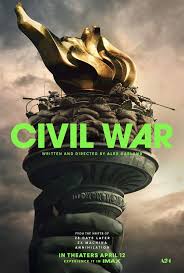
I was shocked by Civil War. I wasn’t shocked by a riveting story about a once-powerful nation torn asunder by internal strife that escalated into mass violence. I wasn’t shocked by a portrayal of a broken political system that led a once-content population to violently rise up and kill its leaders. I wasn’t shocked by the proposition of white supremacist militias gaining military power from foreign actors to turn our country into a real-life version of The Handmaid’s Tale.
I was shocked at how underwhelming this film was.
Director and screenwriter Alex Garland did an interesting and (somewhat) understandable thing. He removed a political point of view from the story. This is understandable because the current state of the country meant that if he portrayed one ideological side or the other as being responsible for starting a civil war, he would lose half the audience before anyone even saw it.
While I understand the reasoning, I personally feel like that’s a cowardly way to make a film.
It’s also no way to tell a story because there are no stakes. While there are hints as to why there’s an uprising against the government, we’re never given clear reasoning. We don’t know what the motivation was for the insurrection. We don’t know what they want or how they will govern when and if they take over. That leaves the audience with no side to root for and no drama or tension in any battle scene. On top of that, the main instigators of the war are an alliance between California and Texas, which, for reasons that should be obvious, is one of the most unrealistic premises I’ve ever come across.
All that leads to a straightforward question: Who cares?
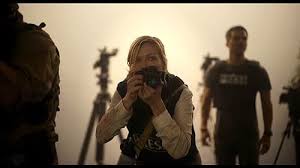
The main thrust of the plot has us following Lee (Kirsten Dunst), a grizzled veteran war photographer who has photographed some of the most heinous atrocities in some of the most violent confrontations of the recent past, and her correspondent partner Joel (Wagner Moura), who want to get from New York City to Washington, D.C. so they can interview the president (Nick Offerman) before the insurrectionists take Washington, D.C. and kill him. Before leaving, Lee’s mentor Sammy (Stephen McKinley Henderson) and super fan and aspiring photographer Jessie (Cailee Spaeny) hitch a ride along with them. Along the way, they encounter advancing rebel forces, military atrocities, and people who want to pretend this isn’t happening before arriving in Washington, D.C., for the climactic battle outside and inside the White House.
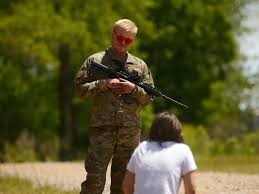
Aside from the second act basically turning this into a road movie (click here to read why I’m not a fan of road movies), their goal is superficial and contrived. They hint at trying to get some important information out of him in the questions that Joel would ask the president, but those questions don’t provide any insight as to how we got here or where we could be going. Not only that, but it seems like they cut a significant scene along the way because things happen in the third act that either don’t make sense or don’t provide any emotional punch. We are given a surface-level telling of this story with no depth, drama, or actual conflict.
By the time we get to Washington, D.C., I’m asking the same question. Who cares?
This film required a brave director who could courageously make this film. A stance needed to be taken, and Garland, whether in his direction or his screenplay, needed to tell the story unapologetically from that point of view. If you think the current state of our government is leading us to a real civil war, make that case. If you believe there are specific leaders whose policies will accelerate that process, put it in the story. Would that have kept some people away from the theater? Probably. Would it have made the movie better and more compelling? Definitely.
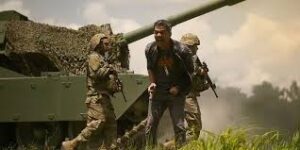
A clear and definite point of view would have at least allowed the audience to care about what happened one way or the other. This film could portray a victory for some, and for others, it would be a tragedy. It should be a tragedy for everyone, but there needs to be emotional engagement for it to be a tragedy. Unfortunately, Civil War failed the one test it’s asking us all to pass.
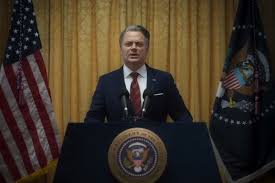
It showed cowardice when it should have shown bravery.